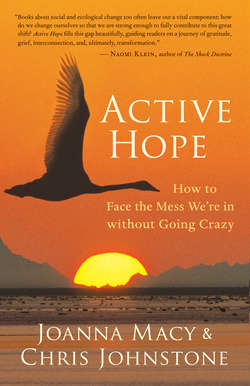Читать книгу Active Hope - Joanna Macy - Страница 46
На сайте Литреса книга снята с продажи.
ОглавлениеCHAPTER FOUR
Honoring Our Pain for the World
Parsifal, a popular knight in the court of King Arthur, was out on a quest and found himself riding for days through a strange, devastated region, a wasteland where nothing grew. Searching for food and shelter, he came to a lake, where he saw two figures fishing from a boat, one of them dressed in royal garments.
“Where can I find lodging?” Parsifal called out.
The regally dressed fellow, who was the Fisher King, invited him to stay at his castle nearby and gave directions. Before long, Parsifal found himself at the great castle of the Fisher King. Welcomed by courtiers, Parsifal was escorted to a hall where a ceremonial banquet was under way. There, on a kind of hammock bed, lay the king, who appeared to be in great pain from a wound in his groin.
The king was victim of a spell that had stopped his wound from healing. This spell had taken from the ruler and his lands the powers of regeneration. Yet as the evening wore on, no one in the court made mention of the horror they faced.
It was known to them, however, that the spell might be broken if and when a knight appeared and asked the king a compassionate question. But Parsifal had been brought up to believe that it was rude, even out of order, to ask questions of people in authority. So even though he approached the king to greet him, and could smell the foul stench of his wound, he acted as if nothing was wrong.
The next morning, Parsifal woke up to find that the king, his courtiers, and the entire castle had disappeared. Setting off, he eventually found his way out of the wasteland and made it back to King Arthur’s court. A feast was held to mark the return of this much-admired knight. The celebration was interrupted by the dramatic entrance of a hideous but wise witch called Cundrie. She publicly scolded Parsifal for lacking the compassion to ask about the suffering of the Fisher King and his people.
“You call yourself a knight,” Cundrie cried out. “Look at you! You didn’t even have the guts to ask what was going on.”
Haunted by Cundrie’s accusations and his own feelings of failure, Parsifal fell into a depression. He finally realized he had to return to the court of the Fisher King. It took many years, and many adventures, to find the mysterious castle again. When he did, he found the king in a state of even greater suffering.
This time Parsifal strode right up to the king and knelt before him. “My lord, what aileth thee?” he asked. That Parsifal cared enough to ask this question had an immediate and powerful effect. Color returned to the cheeks of the king, who rose from his couch, his health regained. In the same moment, the wasteland began once again to bloom. The spell was broken.
Parsifal’s story, which is part of the legend of the Holy Grail, was put into writing more than eight hundred years ago.1 Yet the situation it describes, one of great suffering not being acknowledged and of people carrying on as if nothing were wrong, is easily recognizable today. The question “What aileth thee?” or its modern equivalent, “What troubles you?” invites people to express their concern and anguish. There are all kinds of reasons why this question doesn’t get asked, and why, like Parsifal, we sometimes find ourselves caught up in the pretense that all is well, even when we know it isn’t. When this happens in relation to the state of our world, as it so often does, our survival response becomes blocked. This chapter explores what gets in the way of acknowledging disturbing realities and looks at how honoring our pain for the world can break the spell that maintains Business as Usual.
